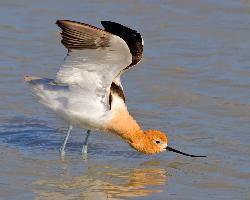
Váhy a míry
| Výška v kohoutku | 45 cm |
|---|
Popis zvířete
The American Avocet (Recurvirostra americana) is a striking and elegant wading bird that graces the wetlands of North America with its presence. With its slender frame, long, thin legs, and distinctive upcurved bill, this species is easily recognizable and a favorite among birdwatchers and nature enthusiasts.Adult American Avocets have a unique and eye-catching coloration. During the breeding season, their heads and necks are adorned with a rusty or cinnamon hue, which contrasts beautifully against their primarily white bodies. The back and wings are a pale grey, providing a subtle backdrop to the more vivid colors of the head and neck. Outside of the breeding season, their plumage shifts to a more muted palette, with the head and neck becoming a pale grey to match the rest of the body. Regardless of the season, the avocet's long, slender legs, which are a striking bluish-grey, and its thin, black bill, which curves upwards towards the tip, are constant features that make identification straightforward.
One of the most fascinating aspects of the American Avocet is its feeding behavior. This bird is often seen foraging in shallow waters, sweeping its bill from side to side in a scything motion to catch small crustaceans, insects, and other invertebrates. This unique method of feeding, along with its specialized bill, allows the avocet to exploit food resources that might be inaccessible to other birds.
American Avocets are also known for their dramatic and synchronized breeding displays. These rituals include intricate dances, vocalizations, and flights that are performed by both males and females. Such displays not only strengthen pair bonds but also play a crucial role in defending territories against rivals. When it comes to nesting, these birds prefer to lay their eggs on the ground, typically on islands or mudflats that offer protection from predators. The nests are shallow depressions, sparsely lined with materials found nearby.
The species is highly sociable, especially outside of the breeding season, when they gather in large flocks. These flocks can be found in a variety of aquatic environments, from saltwater marshes to freshwater lakes, throughout their range, which extends from the western and midwestern United States into parts of Canada during the breeding season. In the winter, they migrate to the southern United States and as far south as Central America, where they continue to inhabit coastal and inland waters.
Conservation efforts for the American Avocet include protecting wetland habitats from development, pollution, and other threats. Although currently not considered endangered, the health of their populations is closely tied to the health of wetland ecosystems, making habitat conservation a priority for ensuring the species' future.
In summary, the American Avocet is a remarkable bird with a distinctive appearance, intriguing behaviors, and a wide range that spans much of North America. Its presence in wetlands serves as a reminder of the importance of these habitats, not just for avocets, but for countless other species that rely on wetland ecosystems for survival.
Podobná zvířata
Nové fotografie zvířat
Top 10 zvířat
- Dolphin gull (Leucophaeus scoresbii)
- Diana monkey (Cercopithecus diana)
- Moustached guenon (Cercopithecus cephus)
- Galápagos tortoise (Geochelone nigra complex)
- Russian tortoise (Testudo horsfieldii)
- Japanese macaque (Macaca fuscata)
- Stone loach (Barbatula barbatula)
- Greek tortoise (Testudo graeca)
- Common flying dragon (Draco volans)
- Colossal squid (Mesonychoteuthis hamiltoni)
